Lawmaker Says Iran, Saudi Arabia Preparing To Reopen Embassies
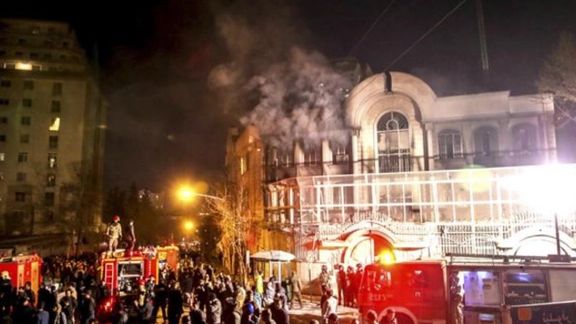
An Iranian lawmaker says Tehran and Riyadh are getting ready to reopen their embassies, closed since Saudi diplomatic missions were attacked by mobs in 2016.

An Iranian lawmaker says Tehran and Riyadh are getting ready to reopen their embassies, closed since Saudi diplomatic missions were attacked by mobs in 2016.
Jalil Rahimi Jahanabadi, a member of the National Security and Foreign Policy committee of the parliament, said in a tweet on Saturdaythat Iran and Saudi Arabia are preparing to restore diplomatic relations, which were cut following the incident.
Mobs led by hardliners attacked the Saudi embassy in Tehranand its consulate in Mashhad, invading the missions, vandalizing, and burning the properties, on January 2, 2016.
Jahanabadi said relations between Iran and Saudi Arabia will have an important impact on easing regional tensions and boosting the unity of the Islamic world.
He called on Iran’s security and media institutions to be careful about activities by the “vicious Israelis and stupid radicals” that may try to disrupt ties between Tehran and Riyadh.
Recently, Iranian officials have been insisting that a new round of Iran-Saudi negotiations will take place, but Riyadh has so far been silent.
One of the most contentious issues between Iran and Saudi Arabia is Tehran’s support for Hezbollah in Lebanon.
Riyadh and Tehran held talks last year to reduce tensions with the aim of restoring diplomatic ties but Saudis have said the talks were exploratory with no tangible results.
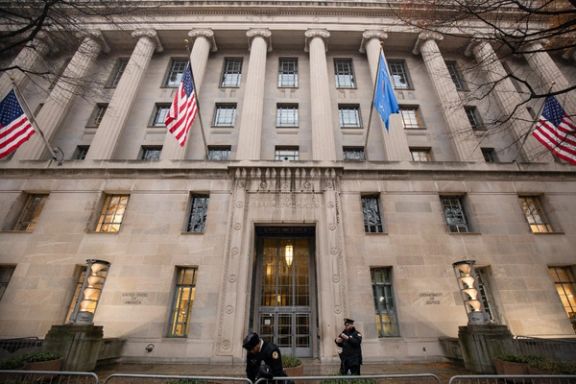
The United States has arrested an Iranian dual citizen for conspiring to illegally export electronic goods and technology to the Islamic Republic.
The eastern district of New York said in a statement on Friday that a criminal complaint has been unsealed in federal court in Brooklyn charging Kambiz Attar Kashani with conspiring to provide products such as subscriptions to proprietary software, fixed attenuators, power supplies and storage systems to the government of Iran.
Kashani was arrested on Thursday in Chicago, Illinois, and will remain in custody pending a detention hearing.
From around February 2019 through June 2021, Kashani orchestrated an elaborate scheme to evade US export laws to send US tech to “the Central Bank of Iran (CBI), which has been designated by the United States government as acting for or on behalf of terrorist organizations”, said Breon Peace, the attorney for the eastern district of NY.
The statement noted that “the CBI has materially assisted, sponsored and provided financial, material or technological support, goods or services to Lebanese Hezbollah, a terrorist organization, and to the Qods Force of Iran’s Islamic Revolutionary Guards Corps (IRGC)”.
To procure the items, he allegedly used two United Arab Emirates companies as fronts to deceive multiple US technology companies, Peace added.
FBI Special Agent-in-Charge Joseph R. Bonavolanta said that “Kashani profited financially by strengthening the economy of one of the world’s most infamous state sponsors of terrorism, while circumventing critical US laws”.
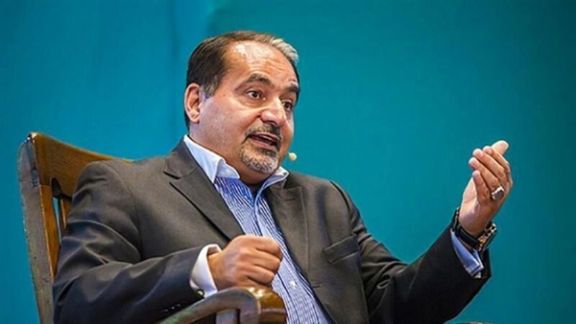
A US-based group has called on the government and donors to suspend financial support for Princeton University due to its inaction against a controversial Iranian scholar it employs.
In a letter published on Thursday, the nonprofit advocacy group United Against Nuclear Iran (UANI) conveyed its deep concern to the president and board of trustees of Princeton regarding the university’s continued employment of Hossein Mousavian.
UANI described him as “an agent of the Iranian regime” who is currently employed as a Middle East and nuclear policy specialist at the university.
In a documentary to mark Qasem Soleimani’s second death anniversary aired by Iranian state TV earlier this month, Mousavian bragged about how Iran’s threat to avenge his killing frightened the wife of Brian Hook, Washington’s special envoy for Iran at the time.
UANI called on Princeton donors to terminate their support, and for all US government grants and contracts with the university to be suspended until it fires Mousavian.
Princeton’s continued employment of Mousavian “makes it impossible for the university to be a safe, welcome, and credible institution of learning for both its students and other employees”, UANI’s Mark D. Wallace said, adding that “no responsible person should support Princeton” while Mousavian remains on its payroll.
Mousavian, who traveled to Iran to attend Soleimani’s funeral service, was Tehran’s ambassador to Germany when four Iranian dissidents were assassinated at a Berlin restaurant in 1992.
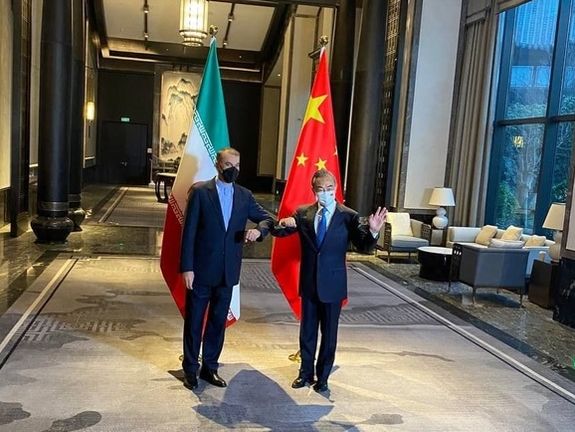
Iranian Foreign Minister Hossein Amir-Abdollahian and Chinese Foreign Minister Wang Yi have announced the launch of a 25-year cooperation deal signed in March.
Amir-Abdollahian said after a meeting with Wang, who is also a state councilor, that the two sides had agreed previously to announce January 14 as the official commencement of the agreement's implementation.
In a tweet in Chinese Friday, Amir-Abdollahian said during his visit he had exchanged views with Wang on a wide range of issues including the cooperation pact and the Vienna talks to restore the 2015 nuclear deal between Iran and world powers known as the Joint Comprehensive Plan of Action (JCPOA). "We reached important consensus on these matters], the Iranian foreign minister tweeted.
A summary of the meeting between Amir-Abdollahian and Wang was posted on China's foreign ministry Saturday according to which Wang reaffirmed China's opposition to US sanctions against Iran and blamed the United States’ unilateral withdrawal from the JCPOA as the reason for current difficulties with Iran. China and Iran are both subjected to US sanctions.
This week, the Biden Administration also tried to blame lack of progress in the nuclear talks on former President Donald Trump’s decision to withdraw from the Obama-era nuclear agreement.
Wang also said China firmly opposes political manipulation through topics including human rights, and interference in the internal affairs of Iran and other regional countries in an apparent reference to the US and its European allies' demand to include such topics in the Vienna nuclear talks.
A 25-year cooperation pact between Iran and China, according to Iran's Tejarat News, was first proposed by Iran's Supreme Leader Ali Khamenei during Chinese President Xi Jinping during his 2016 visit to Tehran. The agreement was signed on March 27during Wang's visit to Tehran.
The pact has been very controversial in Iranbecause its details have never been disclosed. A leaked copy of the final text only outlines the general terms of the agreement, but Tehran officials, beleaguered by economic crisis they cannot solve, hope it will bring billions in investment and make Iran part of China' Belt and Road Initiative, a multi-trillion-dollar infrastructure scheme intended to stretch from East Asia to Europe. The project aims to significantly expand China's economic and political influence and has raised concerns in the United States and elsewhere.
"The 25-year agreement with China will have an important role in strengthening the country's infrastructures. It will transform aerial navigation, petrochemical and oil infrastructure, urban and road transportation, as well as IT and communications," Ali Nikzad, deputy speaker of the Iranian parliament told the official news agency IRNA Saturday.
The Chinese foreign ministry's summary of the meeting between Amir-Abdollahian and Wang on Friday said the agreement would deepen Sino-Iranian cooperation in areas including energy, infrastructure, agriculture, health care and culture, as well as cyber security and cooperation with other countries.
Critics of the pact in Iran believe closer relations between Tehran and Beijing will provide a better foothold for China in the Middle East that Beijing depends on for its energy needs, as well as economic benefits without significantly contributing to the Iranian economy.
The flagship hardline newspaper Kayhan accused the critics of the Raisi administration's pursuit of closer relations with Eastern countries, namely China and Russia, of opposing the Chinese pact to mislead the public and sabotage Tehran's relations with Beijing and Moscow in order to secure the interests of the West.
"They are worried about the possible economic breakthroughs through Iran's strategic relations with Eastern countries which will neutralize the impact of US sanctions," an article in Kayhan said Saturday.

For the second time in less than a month the Iranian parliament’s presidium has stopped a motion to impeach one of President Ebrahim Raisi’s economic ministers.
Criticism of ministers come mainly from within the conservative camp that supports Raisi and his administration. However, the dissent among economic and industrial leaders is so loud that even conservative lawmakers cannot ignore it.
On December 28, dozens of lawmakers tabled a motion to impeach populist Labor Minister Hojjat Abdolmaleki but Majles Speaker Mohammad Bagher Ghalibaf stopped the motion and called on lawmakers to give the minister another six months to tackle rising unemployment and create jobs for young Iranians.
On January 13, tens of Iranian lawmakers tabled another motion to impeach Industry Minister Reza Fatemi Amin for failing to stand by his promises including making Iranian-made cars cheaper and boosting their quality. Although only 10 lawmakers need to sign an impeachment motion, nearly fifty lawmakers signed. Nonetheless, the Majles (parliament) presidium refused to acknowledge the receipt of the motion, stopping the impeachment for the time being, said Lotfollah Siahkali a member of the Industry Committee of the Majles.
According to Siahkali, although Amin's supporters are lobbying at the Majles to prevent the minister's impeachment, tens of Iranian lawmakers are adamant to have the minister impeached as he has failed to convince the parliament about resolving shortcomings in his ministry's performance in the areas of automobile manufacturing and mining., both largely controlled by the government.
Both of Raisi ministers have multiple sectors to cover, yet they have not been observed to attend to the needs of any one of their areas of responsibility. Abdolmaleki, a populist character with controversial ideas about making Lamborghini cars in Iran and turning Iran into the world's biggest economic power on the condition of boosting its population to 150 million, is officially the Minister of Labor, Cooperatives and Welfare, and in charge of tens of companies and institutions including the country's Pension Fund.
Amin's official title is the Minister of Industry, Mining and Trade. However, he is a modest man who has not been seen making outlandish claims.
Abdolmaleki had promised to create jobs at the cost of ten million rials each (around $40) but recently backtracked and said that his ministry is not in charge of creating jobs although he insisted that creating every job does not cost more than 40 dollars.
One of the reasons for the impeachment of industry minister Amin is an 18-percent rise in the price of Iranian made autos within a matter of weeks after President Raisi called for controlling car prices. Amin supported the price rise, arguing that the increase in car prices is less than half of the inflation rate in Iran. The annual inflation rate is around 45 percent.
Siahkali said that what the Minister claims to be an 18-percent rise is not accurate and in fact the price rise is much more than that, however, he did not give an accurate figure. The lawmaker added that "while the real price of Iranian made cars is less than $10,000, the government that owns or controls all of the factories, sells them for $20,000. The buyers are unhappy about this. The president is unhappy. Even the car makers are unhappy. So, the minister should explain why he has doubled car prices."
Siahkali said he was ready to take back his call for impeachment if the ministry returns car prices to what they were before. "Otherwise, we will insist on the impeachment and I am sure the impeachment will happen before the end of [the Iranian] year,” in late March, he said.
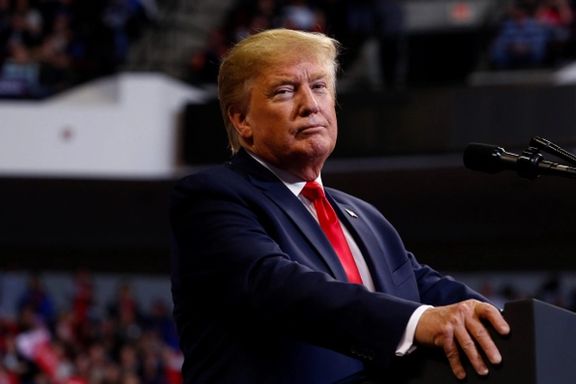
Iran’s hardliner Kayhan daily wrote Saturday that an animation video depicting the killing of former US President Donald Trump has caused “terror and fear” in the “terrorist American government.”
Kayhan, which is financed by the office of Supreme Leader Ali Khamenei, is one of the most radical, hardliner newspapers in Iran. Its chief editor is also appointed by Khamenei.
Khamenei’s official website on Thursday posted the video showing the assassination of former President Donald Trump on a golf course.
The animation shows an all-terrain vehicle with an operator on board driving through a golf course and approaching a point from where its camera shows a man who looks like Trump playing golf. The operator targets the figure and a large gun on top of the vehicle aims at the target and the video ends.
Khamenei and top civilian and military leaders have repeatedly said they will avenge the killing of Qasem Soleimani, the Iranian military and intelligence operator who organized and controlled anti-Western and anti-Israeli militant groups in the Middle East. Trump ordered his killing in early 2020. He was one of Khamenei’s most trusted people.
Former Secretary of State Mike Pompeo, who is one the Americans named by Iran for revenge, said Friday that while Tehran is threatening to kill former US officials, the Biden Administration continues its nuclear negotiations in Vienna.